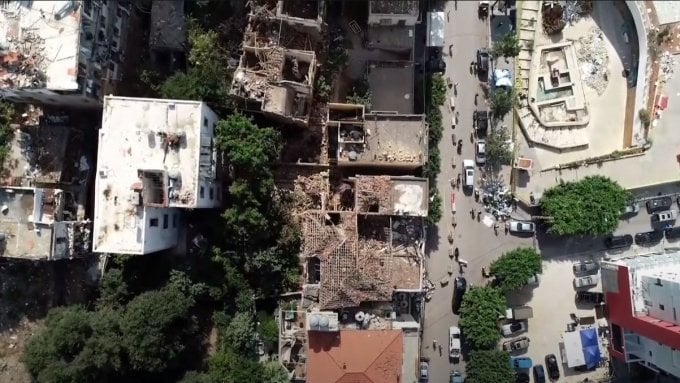
Read our 2024 annual report

Knowledge Hub
Nine months after an explosion rocked the city of Beirut in Lebanon, Concern's Dom Hunt reflects on the inspiring volunteer response to support those most affected
One of the most striking things in the immediate aftermath of the Beirut Port explosion on 4th August 2020 - other than just how extreme and widespread the damage was - was the response.
Not by the government, the army, the UN or the INGOs – by ordinary people.
People from all walks of life; individuals, volunteer groups, civil society organisations and local NGOs; Lebanese, Syrians, Palestinians and migrant workers; came together and started the clean-up. Within a few days, many of the wounded were given initial life-saving medical treatment, the majority of the streets had been cleared of debris, and food and water were distributed. Against the backdrop of suffering and trauma came this incredibly inspiring display of humanity at its best.
“Before the crisis is not like after the crisis, we all learn that we love one another. Even if we are all of different countries, we all have the same hearth.”
Civil society works well in a crisis. People are fast, they crowdsource funds rapidly, and they understand the trauma of those caught in the blast – because they were too. This cross-section of society in Beirut included highly-trained and extremely capable engineers, doctors, nurses, planners, managers, campaigners and activists. They acted immediately, working side by side, based on a shared humanity. They know that there is nobody they can rely on to do this for them. This is the source of the famous ‘Lebanese resilience’ – born of necessity and care for one another.
In the days immediately after the blast, Concern Lebanon launched the Solidarity Project, aiming to support civil society by offering the benefit of our experience responding to emergencies in the north of the country. Concern, along with most other INGOs, was subject to the inevitable delays in attracting funds, coordinating with other actors and recruiting the staff needed to launch our formal response but, as a humanitarian organisation, we knew we had to respond to the blast as fast as possible.
The Solidarity Project was designed from the outset to complement the formal response, enabling us to have a real impact while waiting for the larger suite of interventions to be initiated, and then improving our formal response by being better integrated into the local reality.
The Solidarity approach aimed to empower local organisations to do what they do best. We recognise that the pursuit of ‘localisation’ involves shifting the power dynamics to faciliate management of these crises by local groups and transforming them into true partnerships based on complementary skills and capacities, mutual respect and trust. With these principles in mind, Concern contacted a variety of different civil society organisations, activist and volunteer groups; and offered our support.
The project had an incredible team – an architect, an engineer, social workers, a protection specialist, a GBV case manager, a communications expert and a member of the migrant workers' community. We are from Lebanon, Syria, Palestine, Eritrea, Netherlands and the UK.
The approach has not yet involved the provision of funding – according to Concern guidelines, we must complete a due diligence process before we enter a formal partnership and provide funding to an organisation. While this is time-consuming, it is necessary; we do this to ensure that our funds are not misused, that groups are genuine and representative of who they say they are. Instead, the Solidarity approach focused on the mutual exchange of time, experience, skills and logistic support.
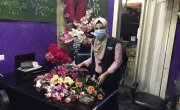
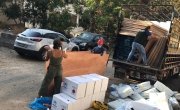
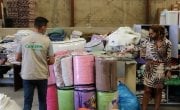
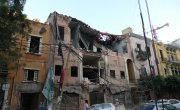
To this end, the project provided training in psychological first aid and how to deal with traumatised people, how to visually inspect a building for safety before entering, how to assess needs, how to protect and share data and how to plan a response. We facilitated connections between groups – including Rise, Wing Women, People’s Solidarity, Al Asmakh and Hemet Shabeb - to allow arrange transport for groups that had furniture to donate, or engineers to groups who needed help with shelter construction.
Given the COVID-19 pandemic, MSF provided us with infection prevention training and reusable facemasks for us to pass on. We secured a warehouse (identified by Rise) and provided warehouse management and trucks to support anyone who needed it.
We witnessed amazing and inspiring work, but we also witnessed racism. African and Asian migrant workers were also caught up in the blast, volunteered alongside everyone else, but received less assistance. This led to a campaign against racism, including three short videos for social media called Migrants Are Human Too, in order to urge all responders to remember the migrants and help them too.
This migrant focus led us to deepen our solidarity support to one organisation – Al Makan – and, with them, we established a transitional safe shelter for homeless migrant workers. Called ‘Ahlan’ (which means 'welcome' in Arabic), the 86-bed shelter is spread over five apartments. Concern rehabilitated the apartments, furnished them, and paid for one year of rent upfront. We also arranged for a protection and psychosocial support expert to provide ongoing support to Al Makan in some of the trickier aspects of managing a shelter, aiming to ensure they are comfortable taking on the long term management of the shelter – for it is theirs, not ours.
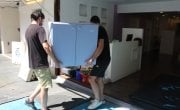
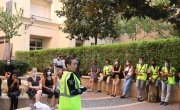
We are now developing closer links to legal services (Legal Action Worldwide), mental health support (MSF), and migrant-led initiatives, so we can better address some of the complex issues that the residents of Ahlan have
In time, the Solidarity approach came to complement and permeate our ‘formal’ response. Flowers were distributed alongside the delivery of UNHCR shelter materials to people whose apartments had been badly damaged, as an expression of empathy and shared trauma. Al Asmakh received education materials to give a smile to children. We carried out needs assessments with volunteers from the groups we had supported.
We coordinated our ECHO-funded rehabilitation work with the six civil society groups in the area, sharing the burden, helping each other out, and continuing to provide support to them where needed. Our partner Home.Work alsotrained migrant workers in construction skills for rehabilitating small enterprises, which in turn provided employment to people who need it.
Where there is a vibrant civil society, the Solidarity Project is an excellent example of people power - complemented by an empowering and localised approach - can improve an emergency response.
Special thanks to Jade van Huisseling for her contributions to this piece
Find out more about our work in Lebanon
Follow the link below to read more about Concern's wide-ranging work in Lebanon, where we have been in operation since 2013 in response to the Syria crisis.



